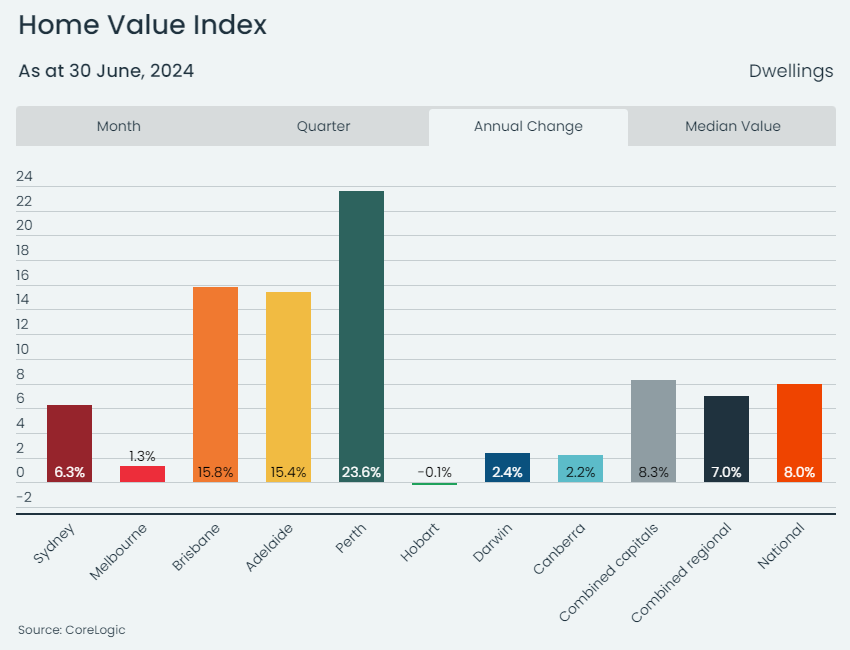Why now might still be a good time to buy a house
Anyone holding out for falls in property prices from rate rises has had their hopes dashed in the past two years. After all, the latest CoreLogic report saw national dwelling prices rise 8% across FY2023-24, a contrast to the 2% decline of the previous year.
While many commentators anticipated rate hikes would see more mortgages in arrears, they didn't count on the chronic undersupply of housing in Australia, along with record migration numbers. The end result? Property has continued to climb, though exact figures differ depending on region and activity.
Perth, for example, saw an annual increase of 23.6%, testament to the highest migration heading west, while notoriously expensive Sydney and Melbourne *only* gained 6.3% and 1.3% respectively.

While mortgage arrears have gradually increased – and the threat of another hike in August may bump this further – Australian mortgage-holders are more likely to engage with their banks to manage this, and those who do find themselves forced to sell are still selling into an undersupplied market.
You may ask what this all means in terms of whether now is a good time to buy. To answer that, I spoke to Quay’s Chris Bedingfield and Fox & Hare’s Trish Gregory.
The outlook for real estate
Bedingfield notes that historically, residential property has had solid growth, and he doesn’t anticipate this changing.
“Residential property mean-reverts around replacement costs over time. In the past, residential property has done well because not only has it factored building costs, but there’s also been additional inflation baked in courtesy of government charges, taxes and levies on the process,” says Bedingfield.
He’s positive on the outlook, given housing starts are at a national low and supply is low - in fact, he's weighted heavily towards residential property in his portfolio.
“There are times when it’s risky to buy residential. That’s when housing starts are booming and supply is surging and that’s not the environment we’re in now,” he says.

Similarly, CoreLogic tips ongoing growth in the market, with undersupply keeping pressure on prices.
The report states: A material rise in new dwelling supply is likely to be a long time coming, considering approvals are holding well above average and barriers to construction, including compressed profit margins and scarce labour supply, remain significant.
This is further backed by government research. The National Housing Supply and Affordability Council forecast a shortfall to at least 2029, and the State of the Housing System 2024 report stated governments would fall significantly short of its 1.2 million homes goal for the next five years.
In short, residential property is likely to continue to be in high demand – and typically prices follow the demand.
Is now therefore a good time to buy property?
There are a few ways of looking at this.
Gregory focuses less on the immediate prices and more on what property means as a long-term asset.
“When you think about the ASFA retirement standard, and the way Superannuation Guarantee is set, a modest retirement includes owning your own home outright,” Gregory says.
She points to property as being a matter of freedom and security in retirement. It can be your home, or a source of additional income – but it’s essential to work towards having it paid off by retirement.

It’s also something you might not want to think about, but at some stage your property could be critical in funding your needs towards the end of your life – using proceeds to fund nursing care or other needs.
Bedingfield agrees with this view, noting that “property is the cornerstone for most people’s wealth and certainly, Superannuation Guarantee depends on people owning homes.”
The second side of this considers value, and here’s where it can get trickier.
It may sound controversial, but Bedingfield’s view is that the property market is potentially undervalued. (It’s worth highlighting that undervalued is not the same thing as affordable…)
“Housing starts are at a very low national level, which tells you the development feasibilities are not working. This means you are probably buying on average below the cost to build,” he says.
He also reminds buyers that the growth in real estate comes from the value of the land. An easy reminder of this is the dilapidated and unliveable property in Sydney’s Woollahra which sold for $10.6million in recent weeks.
He advocates looking for properties that are “land-rich”, be it houses or apartments in smaller blocks where you get more land per dollar spent.
From a personal perspective, he is also a big believer in buying in big cities – even in less desirable areas: “After all, 30 years ago, places like Paddington were not as desirable. Look at them now.”
Then of course there’s a third thing to consider, and that’s affordability.
The average Australian earns around $98,000 a year before tax, and the median house price in Australia’s combined capital cities is $975,592. Let's say you’ve still somehow managed to save a 20% deposit and stamp duty, it still leaves a large mortgage to fund and the prospect of another rate hike. You still need to fund essentials on your salary. In short, for many, property is out of reach.
Australian capital cities rank in the least affordable 25% of cities in the Chapman University Frontier Centre for Public Policy’s Demographia International Housing Affordability report.
It’s only ever a good time to buy if you can afford it – and that’s factoring changes in interest rates too.
Planning to buy property?
When her clients come to her for advice on saving for deposits or buying, Gregory takes the following approach.
“We start with what the government can give you, such as stamp duty exemptions, first home-buyer grants, military grants. Then we look at the surplus in your salary – what can you save, what investments do you have and what can you cut back on,” she says.
For those who are still trying to build a deposit, timing is also a factor.
“If it’s a short period of time before they plan to buy, we’ll put the money into a good savings account and look at setting a regular deposit into the account. If it’s a longer period, we’ll start looking at investments. I might recommend more risk if they are comfortable with it, such as a growth or high-growth ETF, also factoring a regular investment plan,” Gregory says.
She’ll also discuss options such as purchases to simply ‘get on the ladder’, where they might live in the property for 12 months to take advantage of measures like first-home buyer grants before later using it as an investment property or selling to step in a different preferred area.
From Gregory’s perspective, the strategy doesn’t need to be complex and Fox & Hare are big believers in using index investments to build wealth.
“The more important thing is the behaviour – the consistency and finding extra money to put towards goals,” she says.
She also works with her clients to build a buffer into that planned deposit – after all, housing prices will change if your goal is to buy in five years so you’ll need to factor growth and inflation.
Gregory also recommends buyers agents and mortgage brokers which can really help with buyers finding the best options for them – particularly in expensive markets. It becomes a support network where your financial adviser can work closely with your agent and broker to help you reach your goals (and also be realistic about what you can and can’t do).
To buy or not to buy?
It’s an interesting world we live in. The fact remains that housing is a basic human right – but it is also highly commoditised and undersupplied in Australia (let alone many other countries). There are millions of Australians for whom property may be out of reach. Is now a bad time to buy? Not necessarily. Is now a good time for you to buy? Only you can answer that.
1 topic
1 contributor mentioned

